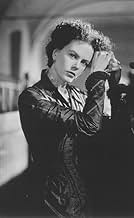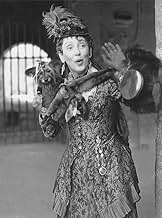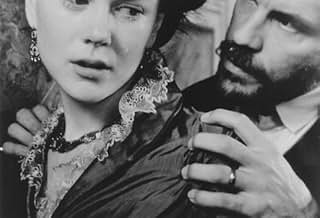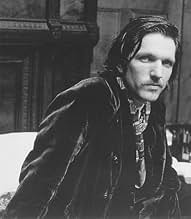IMDb RATING
6.2/10
13K
YOUR RATING
An American girl inherits a fortune and falls into a misguided relationship with a gentleman confidence artist whose true nature, including a barbed and covetous disposition, turns her life ... Read allAn American girl inherits a fortune and falls into a misguided relationship with a gentleman confidence artist whose true nature, including a barbed and covetous disposition, turns her life into a nightmare.An American girl inherits a fortune and falls into a misguided relationship with a gentleman confidence artist whose true nature, including a barbed and covetous disposition, turns her life into a nightmare.
- Nominated for 2 Oscars
- 5 wins & 15 nominations total
Amy Lindsay
- Miss Molyneux #1
- (as Katie Campbell)
- Director
- Writers
- All cast & crew
- Production, box office & more at IMDbPro
Featured reviews
Henry James's "The Portrait of a Lady" stands as one of the greatest psychodramas in literature, a precise and coolheaded dissection of the evolution of a privileged, idealistic if slightly arrogant young woman. This work exemplifies so many qualities which distinguish his view of human nature; he is compassionate, empathetic and observant yet unyielding in exposing the follies, bad judgement and darkness inherent is his characters. No one, especially Isabel Archer, is let off the hook for their misguided choices and her fate is tragic yet completely plausible and, as laid out by James, completely compelling.
A lost opportunity is the best way to describe the film. It is interestingly photographed, full of greys, blues and whites and suggests an almost funereal solemnity in its production design and cinematography. And Nicole Kidman makes a perfect, iridescent Isabel Archer; she looks the part in every respect and certainly conveys the character's intelligence and poignant receptivity to the sights and people around her.
Would that the film had served her better; Jane Campion and the scriptwriter, Laura Jones, eviscerate James's novel but retaining the basic story and structure but put it through the meatgrinder of 90s feminist revisionism. It has been transmogrified into a simplistic tract of victimization and domestic violence, but in doing so Campion and Jones haven't managed to at least raise the story's entertainment value or even create a coherent narrative line for the audience to follow. Rather than present Isabel as a poignant, charismatic figure who unwittingly corrupts her life through bad choices and misguided idealism, the writer and director show us a woman who is victimized by a big bad Man who keeps her locked up in the house, abuses her and steals her money upon duping her into an unhappy marriage. In doing so, James's great work has been drained of its universality and dramatic impact. And while sexual exploitation and gender roles certainly play a part in sealing Isabel's fate in 19th century society, by ignoring the trenchant thematic notions of self determination and the risks of emotional idealism presented by James in his book, we are given a shallow, one-dimensional creation lacking in James's acid edge. Campion cheats a modern audience of discovering filmically a great and still-relevant work by a writer who dared to travel down the darker alleys of a more "civilized" age.
A lost opportunity is the best way to describe the film. It is interestingly photographed, full of greys, blues and whites and suggests an almost funereal solemnity in its production design and cinematography. And Nicole Kidman makes a perfect, iridescent Isabel Archer; she looks the part in every respect and certainly conveys the character's intelligence and poignant receptivity to the sights and people around her.
Would that the film had served her better; Jane Campion and the scriptwriter, Laura Jones, eviscerate James's novel but retaining the basic story and structure but put it through the meatgrinder of 90s feminist revisionism. It has been transmogrified into a simplistic tract of victimization and domestic violence, but in doing so Campion and Jones haven't managed to at least raise the story's entertainment value or even create a coherent narrative line for the audience to follow. Rather than present Isabel as a poignant, charismatic figure who unwittingly corrupts her life through bad choices and misguided idealism, the writer and director show us a woman who is victimized by a big bad Man who keeps her locked up in the house, abuses her and steals her money upon duping her into an unhappy marriage. In doing so, James's great work has been drained of its universality and dramatic impact. And while sexual exploitation and gender roles certainly play a part in sealing Isabel's fate in 19th century society, by ignoring the trenchant thematic notions of self determination and the risks of emotional idealism presented by James in his book, we are given a shallow, one-dimensional creation lacking in James's acid edge. Campion cheats a modern audience of discovering filmically a great and still-relevant work by a writer who dared to travel down the darker alleys of a more "civilized" age.
An interesting film with an undercurrent of sexual repression similar to that in Campion's other films. Nicole Kidman is excellent, given the material, though her transition from likeable, virtuous innocent to a cold and corrupted woman doesn't ring as true as it should--the three years glossed over with a subtitle isn't adequate to show the change. I blame this on the interpretation, direction, and/or editing rather than Kidman's performance, however. Malkovich is not as strong, and one wonders what any woman could see in him as a lover.
The ending is cold and unsettling. Most filmgoers prefer to know that their hero/heroine is "safe" at the end of the story. Here, who knows ?
Production values are good, and the film is quite stylish with interesting use of camera tilt, lighting, and angles. It's quite artsy. I am glad I saw the film, but acknowledge it's not likely to be everyone's cup of tea.
The ending is cold and unsettling. Most filmgoers prefer to know that their hero/heroine is "safe" at the end of the story. Here, who knows ?
Production values are good, and the film is quite stylish with interesting use of camera tilt, lighting, and angles. It's quite artsy. I am glad I saw the film, but acknowledge it's not likely to be everyone's cup of tea.
I have always enjoyed period pieces, good adaptations even more so. This film, however, is really only worth a 5 - an average film - if not for the strong performances of the supporting cast. The work of Barbara Hershey and Martin Donovan in particular is stellar, raising my rating to 6 on their merit alone.
Aside from those two, this film is an exercise in 'almosts' and 'not quites'. It is almost engaging enough, yet just short of drawing me completely in. It not quite makes me believe Nicole Kidman's Isabel is worthy of the love of so many. The love shown by the suitors is believable enough (again, a well acted supporting cast), I simply do not quite believe the object of that love would elicit it.
Still, the film is good. It is a pity, though. It could have been great.
Aside from those two, this film is an exercise in 'almosts' and 'not quites'. It is almost engaging enough, yet just short of drawing me completely in. It not quite makes me believe Nicole Kidman's Isabel is worthy of the love of so many. The love shown by the suitors is believable enough (again, a well acted supporting cast), I simply do not quite believe the object of that love would elicit it.
Still, the film is good. It is a pity, though. It could have been great.
Nominated for two oscars, but neither one was for the leads. a period piece, in 1872. Nicole Kidman is Isabel Archer, who isn't ready to marry, in spite of the proposals from well to do european gentlemen. a galaxy of co-stars - Malkovich, Barbara Hershey, Christian Bale. her friends and family are concerned, even shocked at the opportunities she's passing up. she meets up with Gilbert (Malkovich), and is intrigued by him. what she doesn't know is that he and Madam Serena (Hershey) are toying with her. some similarities to Dangerous Liaisons, also Malkovich!. this one is a little more complicated, since Gilbert's daughter Pansy is also involved. Portrait of a Lady was one of the last films of Shelley Winters. she's the disapproving old aunt, who thinks Isabel is shameful for passing up these chances. also the other Shelley.... Duvall. lot of talking and discussions. much like a jane austen or Bronte Sisters novel. it's pretty good. strategic mind games, as possible romances are considered or denied. the sound is a bit odd. frequently there is an echo from microphone placement... not sure if that was intentional or not. and many scenes are sparsely lit, so sometimes it's confusing to know who's currently talking. Isabel makes her choices, then has to live with them. life lesson there. directed by Jane Campion... won the oscar for The Piano.
Many people could not warm up to this remarkable adaptation of Henry James' novel, A Portrait of a Lady. The dark, abusive themes and open ending are not part of typical costume drama fare, but both are true to Henry James' novel and to Jane Campion's vision.
Henry James originally wrote the novel in the 1880s. Intended as an exploration of what a woman might do if she were given independent means, James' book indicts women as being trapped by a weaker nature. Exploring the same material Campion's movie comes to a different conclusion.
The adaptation and direction are superb. The movie maintains the steady rhythm of doom that makes James' novel an enduring classic. There is no place where this is more evident in the film than in its lingering images. The camera holds on to the subject a moment longer than expected, making the viewer a little uncomfortable, and anticipating sudden disaster that never quite arrives. Ms. Campion directs this film like a horror film, which is exactly what it is.
The acting in this film is also convincing, from Nicole Kidman's paralyzed Isabel, to John Malkovich as a hypnotically terrifying pursuer. They are backed by a solid cast of major actors in minor roles, all adding to Isabel's complex societal tragedy.
Portrait of a Lady, particularly this film adaptation, is a remarkable example of how stories may stay the same, but their meanings change over time.
Related films include: Washington Square (1997), The House of Mirth (2000), The Buccaneers (1995)(mini).
Henry James originally wrote the novel in the 1880s. Intended as an exploration of what a woman might do if she were given independent means, James' book indicts women as being trapped by a weaker nature. Exploring the same material Campion's movie comes to a different conclusion.
The adaptation and direction are superb. The movie maintains the steady rhythm of doom that makes James' novel an enduring classic. There is no place where this is more evident in the film than in its lingering images. The camera holds on to the subject a moment longer than expected, making the viewer a little uncomfortable, and anticipating sudden disaster that never quite arrives. Ms. Campion directs this film like a horror film, which is exactly what it is.
The acting in this film is also convincing, from Nicole Kidman's paralyzed Isabel, to John Malkovich as a hypnotically terrifying pursuer. They are backed by a solid cast of major actors in minor roles, all adding to Isabel's complex societal tragedy.
Portrait of a Lady, particularly this film adaptation, is a remarkable example of how stories may stay the same, but their meanings change over time.
Related films include: Washington Square (1997), The House of Mirth (2000), The Buccaneers (1995)(mini).
Did you know
- TriviaFirst collaboration between director Dame Jane Campion and Nicole Kidman. However, it was Campion who discovered Kidman, where she, at the age of fourteen, was performing at Australian Theater for Young People and subsequently caught the eye of Campion.
- Goofs(at around 47 mins) A horse carriage is passing through the shot from right to left. The crew with dolly-cam and equipment is clearly visible.
- Quotes
Ralph Touchett: I love you but without hope.
- Crazy creditsJane Campion thanks her family, Colin, Alice and Richard, for their generous support, suggestions and encouragement during the making of this film.
- SoundtracksImpromptu in A Flat Major, Op 90 No. 4, D899
(1828)
Composed by Franz Schubert
Adapted for screen by Brian Lock
Performed by Jean-Yves Thibaudet (as Jean Yves Thibaudet)
Courtesy of Decca Records Company Ltd.
- How long is The Portrait of a Lady?Powered by Alexa
Details
- Release date
- Countries of origin
- Languages
- Also known as
- The Portrait of a Lady
- Filming locations
- Palazzo Pfanner, Lucca, Tuscany, Italy(Osmond's palace in Florence)
- Production companies
- See more company credits at IMDbPro
Box office
- Gross US & Canada
- $3,692,836
- Opening weekend US & Canada
- $107,819
- Dec 29, 1996
- Gross worldwide
- $3,692,836
- Runtime2 hours 24 minutes
- Color
- Sound mix
- Aspect ratio
- 2.35 : 1
Contribute to this page
Suggest an edit or add missing content





































